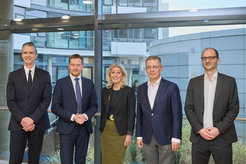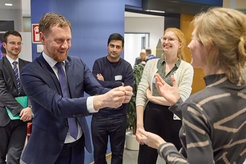"An open culture of welcome is essential for science"
Visit of Saxony’s premier Kretschmer at MPI CBS
On Wednesday, February 14, 2024, the premier of the state of Saxony, Michael Kretschmer visited the Max Planck Institute for Human Cognitive and Brain Sciences in Leipzig (MPI CBS) and learned about the latest research projects and ongoing studies in the field of neuroscience.

His visit began with a welcome address from Christian Doeller, Director of the Department of Psychology and Vice President of the MPG, in which he emphasized how important freedom of opinion and the open exchange of ideas are for science - "because our entire blueprint is based on ideas! From idea to experiment to knowledge gain and into society. We are proud to make a significant contribution to the generation and dissemination of knowledge, which forms the basis for an open and democratic society." Science is solely committed to the truth, he said and emphasized: "Fake news, hatred and agitation have no place here at the MPG!"
He then went on to address the political situation in Saxony - because the current election polls show a "worrying trend". This situation requires close observation and joint efforts to strengthen the democratic process in our society. "Especially for research institutes like ours, an open and democratic welcoming culture is essential in order to attract and retain international junior and top talent in the long term."
Saxony’s premier then spoke to the more than 200 employees of the institute who had gathered in the lecture hall. "I'm going to let you enlighten me today," he said, looking forward to the planned tour of the MRI equipment and laboratories. "The history of the founding of the Max Planck Institutes here in the East at the end of the 1990s moved me greatly," he continued. He thanked the employees of the MPI CBS for the scientific radiance that the institute sends out across national borders.

On the subsequent tour with the directors of MPI CBS, Saxony’s premier Kretschmer learned about the language networks after a stroke from research group leader Gesa Hartwigsen and experienced in the laboratory how the researchers use magnetic stimulation to help affected patients. With Charlotte Grosse-Wiesmann, who heads the "Milestones of Early Cognitive Development" group, he got to know the little study participant Lina Trümper, who was lying in the MRI scanner and being prepared for a children's study. Grosse-Wiesmann explained how she and her colleagues are researching the development of language and cognition in the current study. The researchers are particularly interested in when and how children learn language, and when and how they learn to understand other people and put themselves in their shoes. The tour continued with Sofie Valk and her team from the "Cognitive Neurogenetics" research group, who used computer-aided models to show what shapes our mind and brain.
Finally, at the 7 Tesla MRI scanner, Nikolaus Weiskopf, Director of the Neurophysics Department, explained how the powerful magnetic field can make even tiny fiber connections in the brain visible. The premier was fascinated and wanted to know from the researchers at each station exactly how they study the human brain and what benefits their results have - true to the MPG's core principle "Fundamental findings are the result of curiosity".













